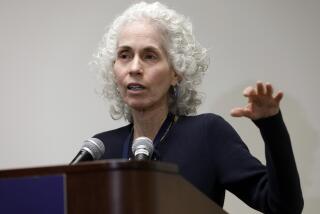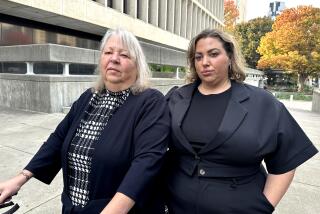New Medicare Policy Tells Hospitalized Their Rights
- Share via
The federal government this week began requiring hospitals throughout the nation to give Medicare patients a written notice explaining their right to appeal, if they believe they are being discharged too hastily.
The statement urges patients who have questions about their medical treatment, the discharge date or similar matters to consult their doctors.
In addition, patients who believe they are being asked to leave too soon are advised by the statement to ask the hospital for a written explanation, and to immediately contact the Professional Review Organization, or PRO, in their region. The PRO is the body designated by the federal Health Care Financing Administration to review the quality and necessity of care for Medicare patients.
The PRO has three working days in which to determine whether the appeal is justified. During that time, the patient may stay in the hospital. If the patient loses the appeal, he may end up having to pay for at least one day of hospital cost.
The mandate, which became effective Monday, was issued by the HCFA following widespread charges by a congressional committee and consumer groups that hospitals were releasing elderly patients prematurely in order to cut their costs.
Last July, Sen. John Heinz (R-Pa.), chairman of the Senate Aging Committee, charged that thousands of sick Medicare patients were being discharged prematurely. He contended that several of 3,500 such patients uncovered by investigators had died.
California Medical Review Inc., the PRO designated by the federal government to do review in this state, has found the problem to be less serious than HCFA had originally predicted.
Better Information
The patients’ rights statement, a HCFA spokesman in Washington said, is intended to strengthen an earlier request that hospitals provide all Medicare patients with verbal information to help them understand their health care rights.
The mandatory statement to be given patients tells them they “have a right to receive all of the hospital care that is necessary for the proper diagnosis and treatment of your illness or injury.”
“Your discharge date,” the statement says, “should be determined solely by your medical needs, not by ‘DRGs’ or by Medicare payments.”
DRGs refers to “diagnostic related groups,” a payment system now used by HCFA that reimburses hospitals a flat fee according to diagnosis, regardless of how long the patient actually remains in the hospital. Critics have claimed that such a payment system may encourage hospitals to discharge patients earlier than necessary.
But according to Ted Fourkas, an official with the California Hospital Assn., some hospitals have been giving patients written notice of their intended discharge date, although the practice has not been widespread.
Eva Skinner, one of two consumer representatives on a statewide committee that advises California’s PRO, said an effort will be made to ensure that patients understand the information they are given by the hospitals. She said PROs are one of the first lines of defense for Medicare patients.
Margaret Shea, assistant to the director of California’s PRO, said her organization expects to have an upsurge in the number of appeals it receives. She said that in addition to the notices that hospitals must now give patients, the American Assn. of Retired Persons is receiving 8,000 requests a day for a booklet entitled “Know Your Rights” that it distributes.
However, she predicted that many of the appeals probably will be based on discharges that some patients may perceive as inappropriate but in fact are medically appropriate.
Such perceptions may arise, she said, because in the past patients were allowed to remain in hospitals until they experienced psychological and comfort satisfaction, whereas today the need to reduce costs makes it necessary to use medical appropriateness as the criterion.
According to PRO’s own statistics over a 16-month period, reviewers ruled in favor of hospitals in 308 out of 325 cases in which patients stayed in the hospital beyond the discharge date.
In a separate study, designed to learn whether patients who do not appeal are being discharged prematurely, the PRO found that 63 out of 2,017 had been discharged inappropriately.
Where to Call
Los Angeles-area Medicare patients with questions about their hospital discharges may call California Medical Review Inc. offices at:
213-381-7761 (Los Angeles)
213-532-2122 (Torrance)
818-996-9891 (Tarzana)
818-584-0555 (Pasadena)
714-621-6956 (Claremont)
More to Read
Sign up for Essential California
The most important California stories and recommendations in your inbox every morning.
You may occasionally receive promotional content from the Los Angeles Times.










